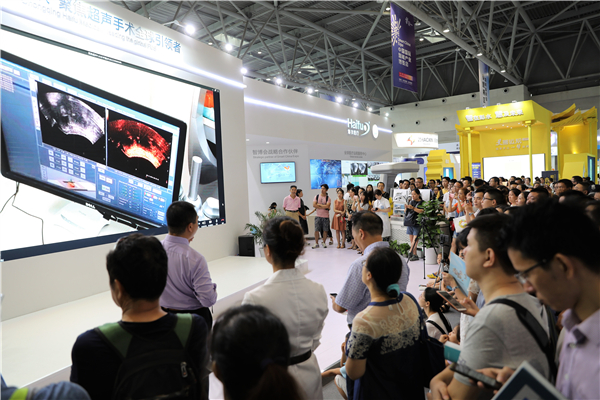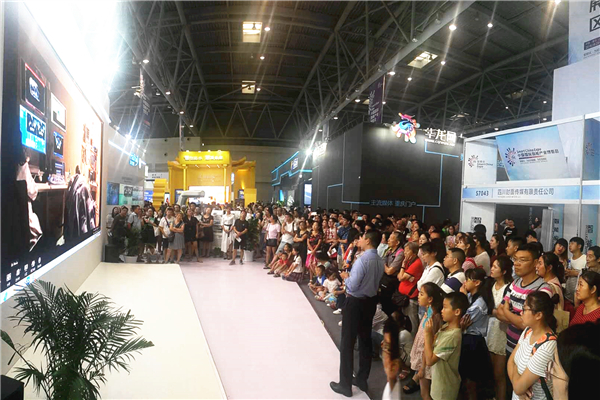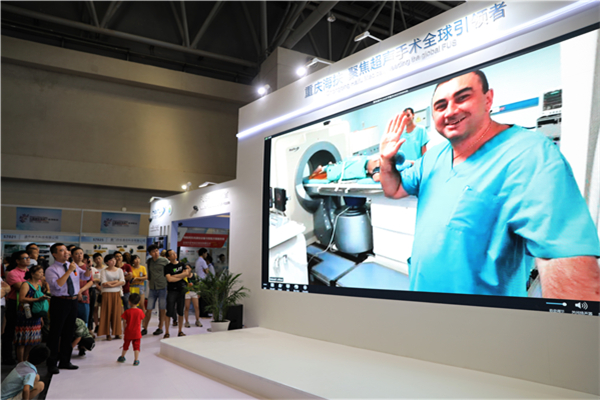A non-invasive tumor treatment: China's med-tech benefits the world
A non-invasive medical technology developed by China allows tumor treatment without the use of a scalpel or laparoscope, bring numerous benefits to people around the world.
By Zhang Jiaqi
At the 2018 Smart China Expo held in Chongqing, China on Aug. 23-25, a focused ultrasound system for tumor treatment developed by China attracted wide attention from visitors.

The system commonly known as Haifu Knife has a feature that is inconsistent with its name: it can treat solid tumors on soft tissues without cutting open the body with a scalpel or invading the body with a laparoscope.
By focalizing ultrasound outside the body onto the targeted tumors inside the body, the non-invasive ablative technology can produce a temperature as high as 65-100 degrees Celsius at the focal point, and induce spontaneous and irresistible necrosis of the tumors without damaging the tissues, said Peng Xiang, European manager of the International Business Department of Chongqing Haifu Medical Technology Co., Ltd., while demonstrating how to use the equipment.
As it causes no injury to the skin, the operation requires no sterilized operating room, and no general anesthesia except minimal analgesia, he added.
A surgery with Haifu Knife at HUMT Hospital of Barcelona University in Spain on Aug. 24 only took around 15 minutes to ablate a 4.5-cm tumor, according to Nuria Pons, one of the doctors who performed the surgery.
During the live presentation of the operation room after the surgery, displayed on a big screen at the expo, the patient said she felt comfortable, and Pons said the non-invasive technology that causes no injury is revolutionary.
Around 24 to 48 hours later, the patient can leave the hospital with no antibiotics and a prescription for mild painkillers, Pons said.
One day before the presentation at the Spanish hospital, Chongqing Haifu was also used at Pleven Medical University Saint Marina Hospital in Bulgaria, in which Prof. Dobromir Dimitrov and his colleagues performed a live Haifu surgery through a big screen at the expo, attracting a large audience at the venue.
These are the first Haifu surgeries in which transcontinental telework was performed in front of an international audience worldwide.
Wang Zhibiao, inventor of the Haifu Knife, said it not only cures the disease with little harm, but also keeps the organs and body intact.
On the name cards of Haifu staff is the mission of the company, "Treatments, Minimize harm to patients." This is a mission Wang has been striving towards for over 30 years.
Wang began his research as the chief physician in an affiliated hospital of Chongqing Medical University in 1988, three years after he graduated from Chongqing Medical University.
He started with fundamental research, working out how to form a focal point in tissues, and how much energy was required to ablate a cubic centimeter of tumors in different organs.
It took him ten years to figure this out, and the first non-invasive ablative equipment was accredited by China Food and Drug Administration in 1999, becoming China's first large medical equipment with independent intellectual property rights (IPR). Chongqing Haifu Medical Technology Co., Ltd. was also established in the same year.
Since 2000, the technology has been applied to many different kinds of tumors like uterine fibroid, liver cancer, pancreatic cancer and bone cancer, all claiming the first case in its kind worldwide.
The first clinical protocol of the technology occurred in China in 2005, and the first International Society for Minimally-invasive and Non-invasive Medicine was established in China in 2014.
"All the firsts give credit to the core technology," Wang said.

Besides his decades of persistence, Wang said the technology would have not been possible without the continuous support from the government.
The national government gave two million yuan to explore the technology during the ninth five-year plan of China, and continued giving financial support for many years on. Besides, Wang and his team also received 30 million yuan from the National Basic Research Program of China.
"With the national support, we don’t feel lonely despite the difficulties along the way of working towards original innovation," Wang said.
Now, besides his position as the chief physician of obstetrics and gynecology, he also works as a professor in Chongqing Medical University, and chairman of Chongqing Haifu Medical Technology Co., Ltd.
His invention Haifu Knife has been used in many hospitals in Chinese cities like Beijing, Shanghai and Chongqing, a procedure covered by medical insurance, and in 25 foreign countries and regions across the world. A total of 56 Haifu centers have been established worldwide.
With national visions like the Belt and Road Initiative, Chongqing Haifu also established a number of training centers in Europe, East Asia and Africa, offering not only equipment, but also services and trainings.
In 2015, Haifu established a medical center in Bara Hospital in South Africa, which was its first medical center in Africa. The center has treated over 350 patients with uterine tumors so far. The medical center in Cairo, Egypt, established in 2016, has treated over 120 tumor patients. In August this year, the center also undertook a training class for 23 clinicians from six African countries.
Haifu not only offers non-invasive tumor treatment that decreases the risk of HIV infection, but also trains talents of minimally-invasive and non-invasive medicine for Africa, which will both benefit the African people, said Rosie Xing, managing director of Chongqing Haifu.
Over the years, the applicable rate of Haifu Knife has increased from only 10 percent to around 70 percent. So far, Haifu has treated nearly 100,000 patients with solid tumors, among which the longest survival time of patients with malignant tumors was 20 years.
However, this is far from Wang's goal of treating five percent of the patients.

There are two million patients with uterine tumors that need operations in China, but last year, Haifu treated only 16,000 of them. Wang said he hopes to realize this goal and export Haifu Knife to over 50 countries and regions across the world over the next three years.
Haifu not only aims to pursue a market expansion, but wants to benefit its patients and the society and to popularize a medical civilization using non-invasive techniques in the pursuit of treatments that minimize harm to patients.
"When patients look at me, I can tell from their eyes what they long for, what they worry about, and what they fear," said Wang, explaining what drove him to work so hard over the past three decades.
"Haifu believes that medical care should warm the people, and with the chance to help the patients when they come to us, we aim not only to treat their disease, but also to teach them to be the master of their health by addressing the causes of their diseases," Xing said.
With 16,600 uteruses safeguarded by Haifu Knife last year around the world, Wang was very proud.
"For a long time, Chinese hospitals adopted medical technologies from the west, but now, with the technology that has China's independent IPR, the Chinese should have more confidence in Chinese medical innovations and products," he highlighted.

